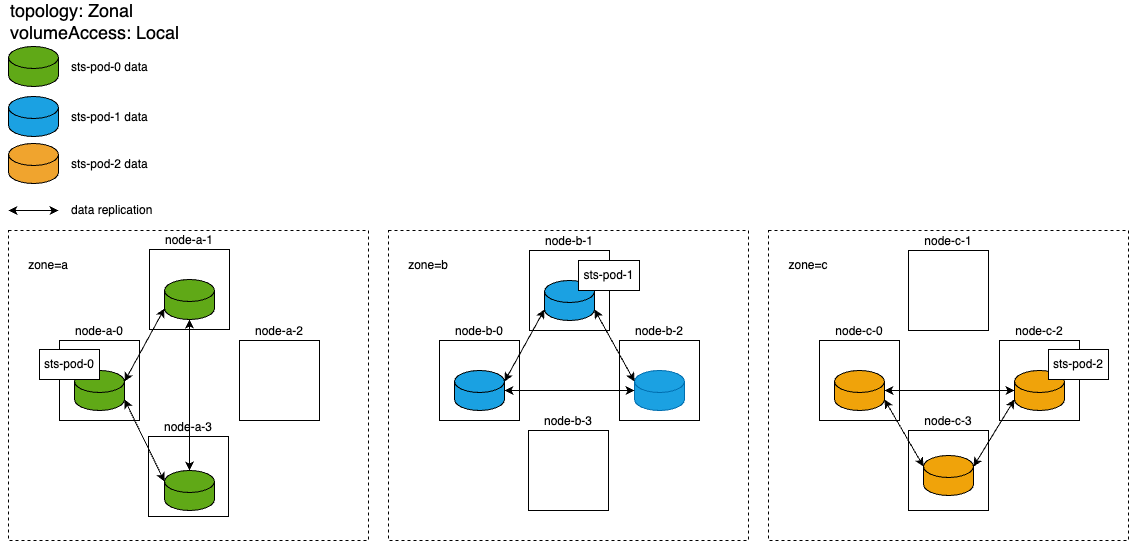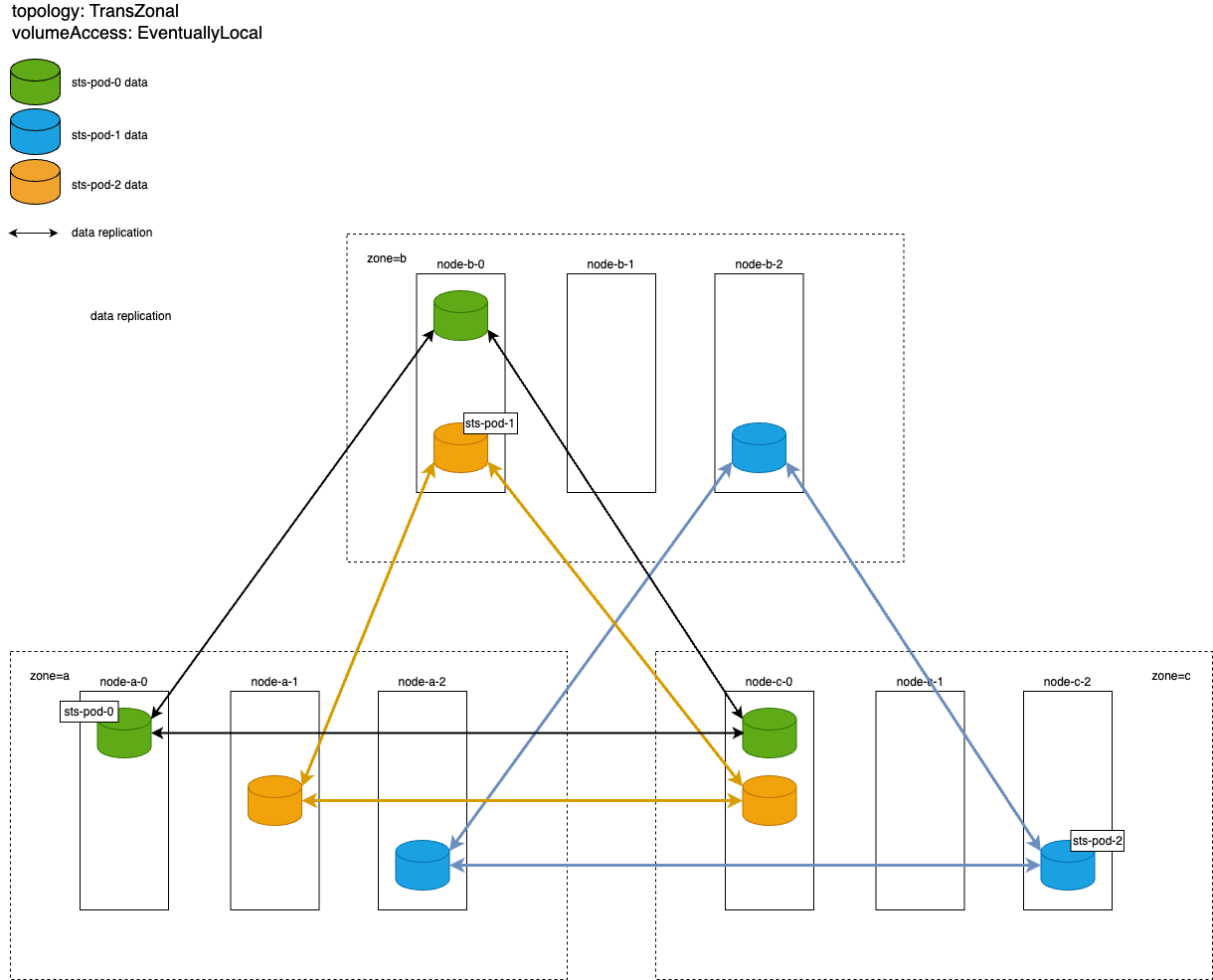The module lifecycle stage: Preview
The module is only guaranteed to work if the system requirements are met. As for any other configurations, the module may work, but its smooth operation is not guaranteed.
Zonal StorageClass with prohibited access to data over the network and high data redundancy
An example of a ReplicatedStorageClass resource:
apiVersion: storage.deckhouse.io/v1alpha1
kind: ReplicatedStorageClass
metadata:
name: zonal-storage-class
spec:
storagePool: storage-pool-name
volumeAccess: Local
reclaimPolicy: Delete
topology: Zonal
-
Parameters of the StorageClass to be created:
- Number of data replicas per volume: 3.
- All volume replicas are created in the same zone to which the scheduler has scheduled the pod that uses that volume.
- No data can be accessed over the network: pods can only be created on the nodes where the data replica resides.
-
Volume replica layout for a single
StatefulSet:
-
Recommendations on how to use a zonal StorageClass:
-
Use it for StatefulSets made up of multiple pods, where the unavailability of one pod along with all data does not cause performance degradation or loss of important data if a single zone crashes. An example would be database clusters with configured high-level replication at the database level.
-
For StatefulSets, it is recommended to use antiaffinity rules of the
requiredDuringSchedulingIgnoredDuringExecutiontype andtopologyKey: topology.kubernetes.io/zoneso that pods are evenly distributed across zones (one pod per zone). -
This StorageClass is suitable for cases where you want to minimize traffic between zones, especially when network latency is high and/or data rates are low. Setting the
topologyparameter toZonaleliminates cross-zone replication, significantly reducing traffic between zones compared to theTransZonaltopology. -
This StorageClass is best suited for cases where high read speeds are essential, as the data is always on the local disk. This is achieved by the
volumeAccessparameter set toLocal, which prevents pods from being created on nodes with no local volume replica and data access over the network.
-
Caution. Regardless of the StorageClass settings, pods cannot be moved to zones without data replicas. This restricts the use of a zonal StorageClass: a pod cannot be rescheduled to another zone (even in case of a crash) from the zone where it was originally created.
Trans-zonal StorageClass with high data redundancy and gradual creation of local replicas
An example of a ReplicatedStorageClass resource:
apiVersion: storage.deckhouse.io/v1alpha1
kind: ReplicatedStorageClass
metadata:
name: trans-zonal-storage-class
spec:
storagePool: storage-pool-name
volumeAccess: EventuallyLocal
reclaimPolicy: Delete
topology: TransZonal
zones:
- zone-a
- zone-b
- zone-c
-
Parameters of the StorageClass to be created:
- Number of data replicas per volume: 3.
- Volume replicas are distributed across the specified cluster zones, with one replica per zone.
- Access to data over the network is permitted: pods can be created on nodes that do not have a local volume replica. If this is the case, 30 minutes after creating a pod on such a node, the process of populating a local volume replica will commence, which involves copying all volume data from other replicas to this node over the network. This enables flexibility in pod distribution — if a node with a local replica crashes, the pod can be rescheduled to a worker node without local data, and after 30 minutes the data will start replicating to that node. However, this may result in a temporary increase in network traffic between zones (as the data will be retrieved from replicas in other zones) and a temporary decrease in read rates (since the data initially can only be accessed over the network).
-
Volume replica layout:

-
Recommendations on how to use a trans-zonal StorageClass:
-
A StatefulSet that consists of multiple pods, where the unavailability of one pod along with all its data may result in performance degradation and/or loss of important data. Critical services are an example of the perfect use case for such a StatefulSet. In these services, each pod stores its unique state locally, and there is no replication of this state between different pods.
-
For such a StatefulSet, it is recommended to use podAntiAffinity rules with the
preferredDuringSchedulingIgnoredDuringExecutiontype andtopologyKey: topology.kubernetes.io/zonetype. In this case, if the cluster is stable and resources are sufficient in each zone, pods will be distributed to different zones — one per zone. If one of the zones is down, the pods will automatically migrate to a running zone where other pods of the same StatefulSet already exist. This helps prevent performance degradation and/or data loss. However, the disadvantage of such podAntiAffinity is that if only one node with a local replica fails in some zone, then the pod will most likely migrate to a node in another zone with an existing local replica rather than to a node without a local replica in the same zone and commence populating a local replica 30 minutes later. -
This StorageClass is only recommended if there is a high bandwidth (10 Gbps) and low ping (less than 25 ms) network connection between zones, and if there is no need to minimize network traffic between zones. Setting the
topologyparameter toTransZonalactivates trans-zonal replication, which results in a significant increase in traffic between zones as compared to theZonalvalue for the same parameter. -
This StorageClass is recommended if high write rates are not considered a priority. The synchronous replication protocol used in DRBD treats a read operation as completed only after receiving confirmation from all replicas of a successful write to the local disk. With three replicas distributed across different zones, the write latency will be higher than with a zonal StorageClass. The exception to this is when the network parameters within a zone and between the zones are similar.
-
Caution. Regardless of the StorageClass settings, you cannot migrate pods to zones without data replicas. This imposes a restriction on the use of trans-zonal StorageClass: a pod cannot be moved to a zone that is not specified in the spec.zones of the trans-zonal StorageClass configuration.